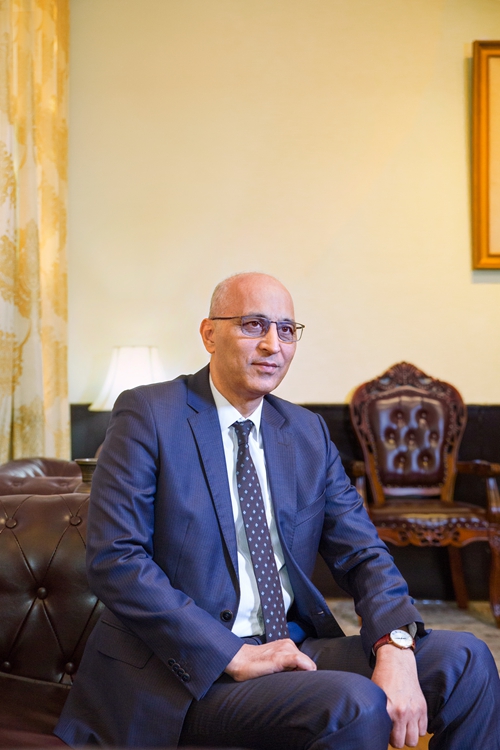
The former Pakistani Ambassador to China H.E. Moin Ul Haque.
Introduction
There is no denying that China and Pakistan enjoy a special and strong bilateral relationship, which has been nurtured over the last seven decades by successive governments and generation of leaders in both the countries. It was elevated to an “all-weather strategic cooperative partnership” during the historic visit of President Xi Jinping in April 2015.
Beyond the G2G relations, the bonds of amity, goodwill and solidarity between the two peoples are equally strong and abiding. We have coined special and unique expressions to define our exemplary relations. In Pakistan we describe it as ‘higher than the mountains, deeper than the oceans, sweeter than honey and stronger than the steel”. In China, the term ‘batie’’, meaning iron brother, is only reserved for Pakistan.
Karakorum highway, an engineering wonder serves as a strong symbol of our friendship. Hundreds of Chinese and Pakistanis workers and engineers gave their sweat and blood in building this strategic link in the 60s and 70s. In fact, almost one Chinese life was lost at every kilometre. A cemetery at Gilgit still reminds us of those sacrifices given for bringing our two people closer.
People in both countries hold special and warm feelings for each other. In a Pew Survey conducted in 2014 on China’s global image, 78 percent Pakistanis viewed China favourably, the highest ranking given by any country.[i] Similarly, a number of surveys done in China have also revealed that over 70 percent of Chinese hold favourable view of Pakistanis.
Thus, it has been always the case that whenever one country is faced with a difficulty or natural disaster, the outpouring of support and sympathy amongst the common people is overwhelming and indeed touching. In his address to the joint session of Parliament during his 2015 visit, President Xi recalled “At the critical times when New China endeavoured to break the blockade, resume its lawful seat at the United Nations and explore ways to carry out reform and opening up, Pakistan always came forward with selfless and valuable assistance.”[ii]
In the same address, President Xi also acknowledged the Pakistani support after 2008 earthquake in Wenchuan by airlifting the entire reserve of tents to China. He also mentioned that the Pakistani medical team removed all the seats of the transport plane to make room for the tents and sat on the floor all the way to China.
We should also not forget the critical and generous support China has provided to us over all these years. In recent times, I recall the Chinese overwhelming support during the difficult and unprecedented Covid-19 pandemic. Over 60 planeloads of essential medical supplies were sent during the early months of the health crises. Later, over 160 million doses of vaccines were provided becoming the mainstay of our inoculation drive thus saving precious lives.
During the 2022 floods, Chinese government and people were in the forefront launching a nationwide campaign to support the victims of the affected areas. From a schoolboy donating his entire pocket money to a factory worker giving his whole monthly salary, the stories from across China were so many and so moving.
China – an oldest civilization
China is one of the oldest civilization. China gave the world important inventions like papermaking, printing, compass, gunpowder, umbrella, silk and porcelain.
Chinese culture is rich and diverse like ours in Pakistan. There may be some differences in social practices, customs and traditions, yet there are many similarities in terms of the values that embody our two societies.
Social harmony, honesty, generosity, respect for elders and family bonding are the values still shaping peoples conduct and behaviour in China. The sayings and teachings of famous Chinese sage Confucius have a profound impact on the Chinese society. The essence of Confucius ‘value system’ lies in his five ethical concepts called Li (propriety), Ren (benevolence), Yi (righteousness), Zhi (wisdom) and Xin (trustworthiness).
The people of Pakistan could also relate to these values espoused by the great master. I believe that this provide a sufficient common ground for our people to understand each other and come closer beyond any differences of language or other cultural practices.
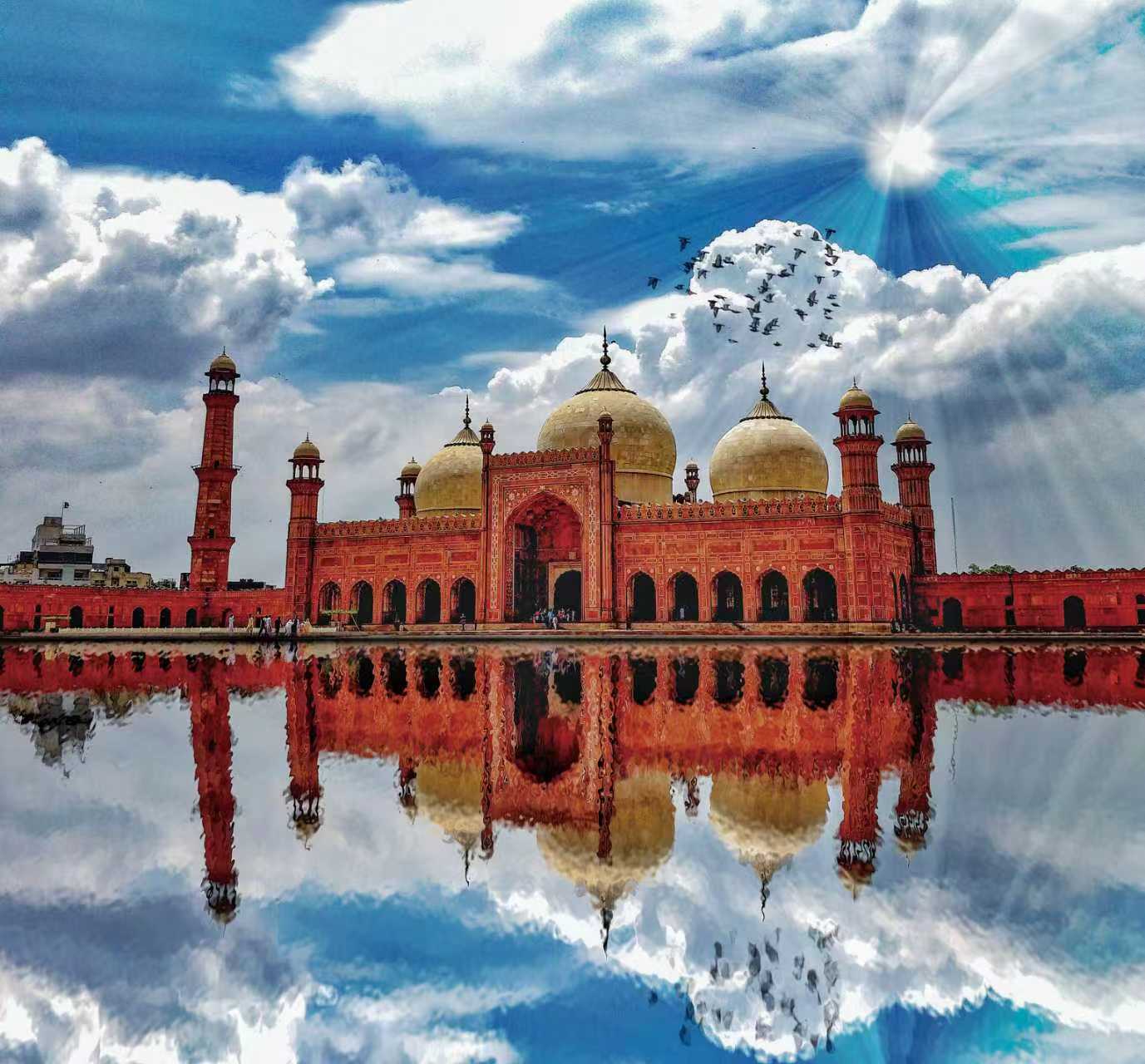
The Badshahi Mosque, located in Lahore, Pakistan.
China-Pakistan Cultural Cooperation Historical dimension
Both China and Pakistan are cradle of ancient civilizations. Historically, people-to-people exchanges had facilitated in blending of civilizations. It was equally true and natural for China and Pakistan being neighbours. The different historical periods from 2nd century BC witnessed exchange of goods, ideas and beliefs. Through interactions and linkages established across the old Silk Route, we have learned from each other enriching our societies.
Braving the treacherous mountains and scorching deserts, Fa Xian and Xuan Zang, the two monks in Jin and Tang dynasties respectively, visited famous Buddhist seminaries of Taxila and Swat and brought back with them the light of knowledge and the warmth of friendship. It is that eternal flame of friendship which still illumines the present-day wide-ranging engagements of our two countries. Chinese Premier Zhou Enlai had noted “the peoples of China and Pakistan have been good neighbours and friends since the dawn of history”.
Formal exchanges
Just few years after establishing diplomatic relations, our two nations signed a Cultural Cooperation Agreement in 1965, which since then has served as the official vehicle for bilateral exchanges in the fields of art, literature, sports, youth affairs, publication, archaeology, education and languages.
Exchange of cultural troupes, delegations, artists and students became a regular feature. Thousands of Chinese workers who came to build the Karakorum Highway contributed to building friendship and goodwill. Today, over 20,000 Pakistani students and professionals in China serve as ideal bridge for further strengthening our friendship.
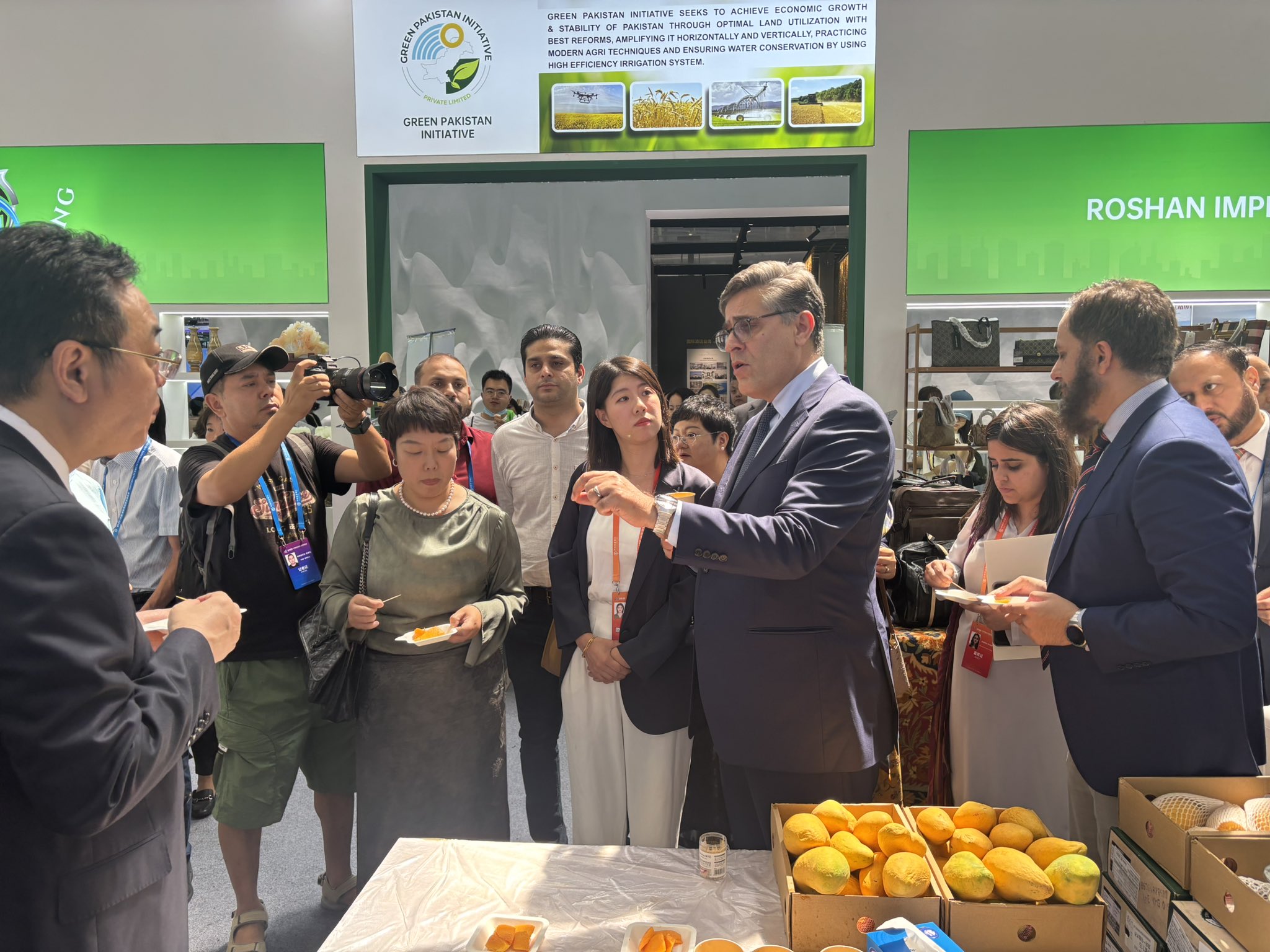
Ambassador of Pakistan to China H.E. Khalil Hashmi introduce Pakistan produce and economic opportunity to the international attendees in front of the Pakistan Pavilion of 2025 China-Eurasia-Expo in Urumqi.
Institutional Arrangements
A Chinese Cultural Centre launched in 2017 at the Pakistan National Council of Arts is serving as a key platform to promote cultural exchanges through various events including exhibitions, films, lectures, performances, and training classes. The agreement to establish the Centre was inked during President Xi’s 2015 visit to Islamabad.
The All Pakistan-China Friendship Association (APCFA) established in 1978 by late Ambassador Mumtaz A. Alvie has also been promoting cultural and people-to-people ties over the last four decades.[iii] Its counterpart, the China Pakistan Friendship Association (CPFA), under President Ambassador Sha Zukang, has also done similar work for many years in China. It has hosted receptions for visiting Pakistani leaders, organized cultural events, carried out fund raising for natural disasters in Pakistan and facilitated business contacts.
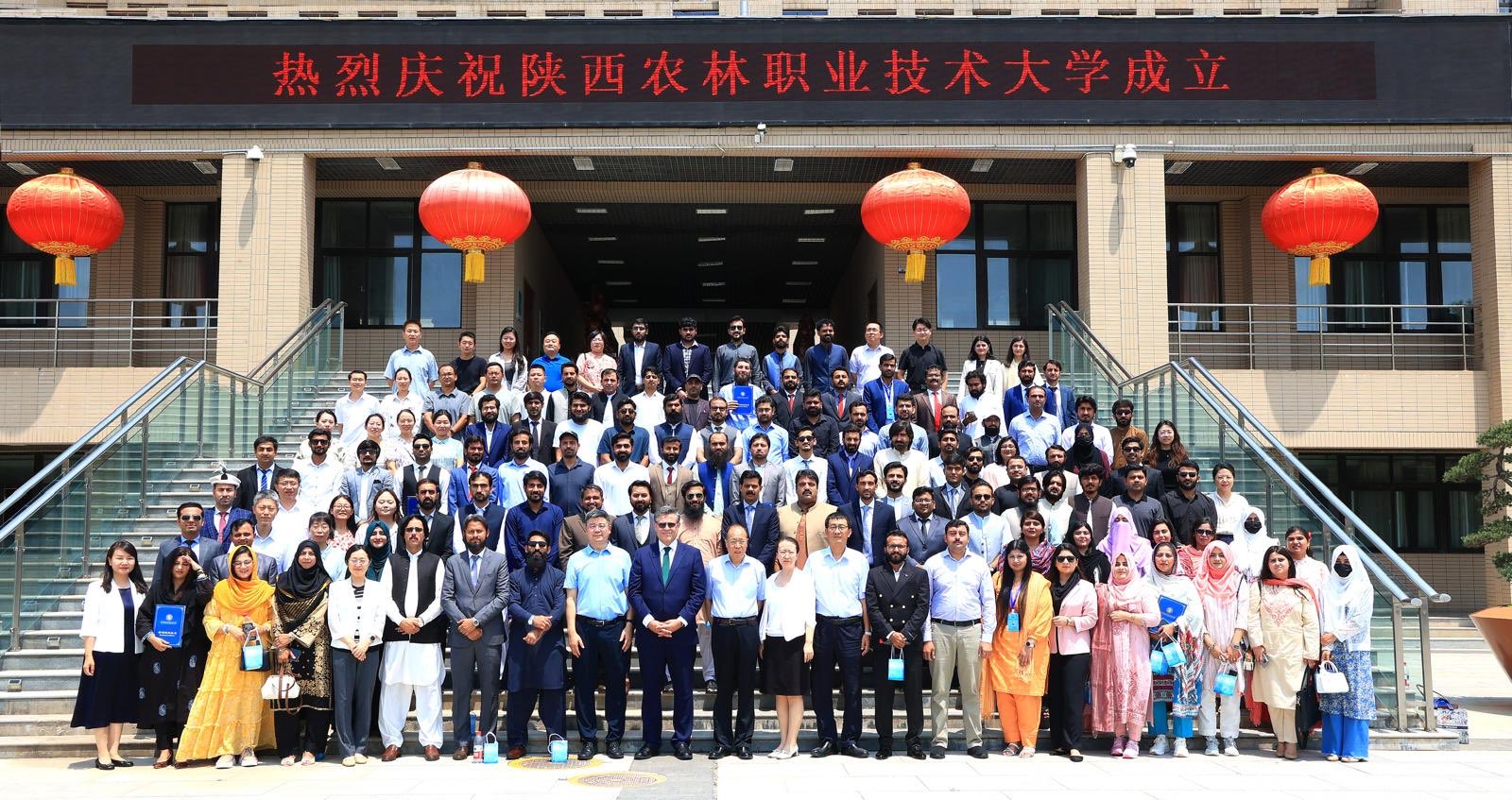
On July 16, 2025, Pakistani students at Shaanxi Agricultural and Forestry Vocational and Technical University took a group photo with Ambassador of Pakistan to China H.E. Khalil Hashmi of Pakistan to China, along with Chinese teachers and students.
There are also a number of institutions and organizations doing specialized work to promote understanding about China in Pakistan and as well as promotion of our bilateral relations. These include China-Pakistan Study Centre at Institute of Strategic Studies, Islamabad [iv], China Study Centre at NUST[v], China Study Centre at Peshawar University[vi], and Pakistan China Institute[vii]. Recently the Beaconhouse National University Lahore has also established a China Study Chair in collaboration with the Chinese Consulate General.
Promoting Urdu and Chinese languages
As part of our Cultural Agreement, special attention was given to teaching Urdu and Chinese languages in the respective countries. Pakistan in collaboration with renowned Chinese universities have established a number of Urdu language and Pakistan Studies Centres - there are now more than 20 such Centres across China. The Urdu language degree program at the prestigious Peking University in Beijing dates back to 1954 providing the ‘intellectual foundation for the steady advancement of people-to-people exchanges”. [viii] Recently, Pakistan Ambassador Khalil Hashmi inaugurated a new Pakistani Study Centre at Shenzhen University to promote academic and research collaboration in emerging technologies.
Similarly, China has also set up its famous Confucius Institute in Pakistan to teach Chinese language and culture. The first one was established in 2005 in NUML, Islamabad, which incidentally was the first in the Islamic World.[ix] There are four other Confucius Centres in Punjab University, Karachi University, Sargodha University and Faisalabad Agricultural University.
Besides the five Confucius Institutes, many public and educational institutions of Pakistan like NUST, COMSATS, Beaconhouse, City, Headstart and Roots also offer Chinese/Mandarin language courses. While learning Chinese is a new fad, many of these institutions market their courses by highlighting the growing importance of the language. For instance, the City School’s Language Proficiency Unit’s Linkedin page asserts “Learning the Mandarin language will open a world of opportunity for you.”[x]
China-Pakistan Economic Corridor (CPEC), which has added a new dimension to our economic partnership, has also been a catalyst to more cultural cooperation and people to people contacts. Thousands of Chinese working on CPEC projects, through their interactions with the locals and CSR initiatives, have also contributed to further strengthening the bonds of friendship. Moreover, the Chinese language skill is now considered a valuable addition to one’s CV for the job opportunities arising from CPEC.
Media cooperation
Media also plays a critical role in promoting bilateral cultural ties. The first news exchange agreement was signed back in 1964 between Xinhua and Associated Press of Pakistan, the premier news agencies of the two countries. As a result, besides exchange of news and other services, both the agencies maintain their correspondents in the respective countries.
A Dosti Radio Channel (FM98), a joint initiative of Pakistan Broadcasting Corporation and China Radio International (CRI), was launched in December 2016. Recently APP has also launched Chinese language news service aimed at promoting a better understanding of Pakistan, CPEC and China Pakistan relations.
Other major Chinese media houses lik People’s Daily, CCTV, Phoenix TV and China Economic Daily have also their bureaus in Pakistan[xi]. With advent of social media, Chinese famous video hosting service TikTok is very popular in Pakistan with over 54 million users [xii]. Another Chinese video sharing platform SnackVideo (known as Kuaishou in China) is also gaining popularity in Pakistan.
PTV, which for many years was the sole TV channel in Pakistan, had co-produced with CCTV, a number of interesting dramas to promote our friendship with China. The two dramas aired in the 80s are worthy of mention here. One was called “Paiman-e-Wafa”, and was based on connection between hockey players from both countries. The other was “Rishtay aur Rastay”, based on the friendship stories around the construction of Karakorum Highway. Top TV artists of that time played major roles in these two dramas.[xiii]

Poster for the Chinese-Pakistani co-produced animated film Allahyar and the Legend of Markhor.
In the film area, there have been sporadic screening of some movies in respective countries over the years. In the last five years or so, two Chinese movies namely “Shadow” and “Postmen in the mountains” were screened in Pakistan. Famous Pakistani movie “Parvaz hai Junoon” which was screened in China in 2020.
As part of recent efforts for co-production of movies, the two notable films are “Allahyar and the Legend of Markhor”, the first joint production of an animated movie, and “Batie Girl”. There is definitely more scope for new co-produced movies to spread the wonderful stories of our friendship.
Under the CPEC framework, a CPEC Media Forum was established which held its 1st meeting in 2014 in Islamabad. So far six Forums have been held highlighting the importance of media for promoting cultural cooperation, people to people exchanges and maintaining close collaboration to address false reporting and negative coverage around China-Pakistan relations and CPEC.
Music and Folk Dance
Over the years, there has been music collaboration as part of cultural exchanges, with holding of music concerts and joint release of songs. Pakistan National Council of Arts had organised concerts of Chinese performing arts in Islamabad in 2018 and 2022. Pakistani dance and music troupe participated in the China Xinjiang International Folk Dance Festival in Urumqi in 2017 and then at the International Folk Culture and Art Festival held in Silk Road Arts Centre in Langfang, Hebei in 2023.
The hit music video “You have stolen my heart” by Pakistani singer Ali Zafar and Chinese singer Xiang Minqi was released in 2021 to commemorate the 70th anniversary of Pakistan-China diplomatic relations. Recently, Pakistan Embassy in Beijing, as part of celebrations of 74th anniversary of diplomatic relations, organized a special event where a Chinese orchestra played iconic Pakistani songs showcasing harmony of cultures and our timeless friendship.
Cuisine
Since many years, there has been a craze for Chinese food with Chinese restaurants in almost all main cities of Pakistan. As a young boy growing up in Quetta, I still remember my father taking me to the newly opened China Café in the 70s, my first introduction to Chinese food. I can still feel the taste of the Hot and Sour Soup, the beef Chow mein and the crispy prawns.
While many Chinese friends tell us that Chinese dishes served in our restaurants have been indigenized, yet with the advent of CPEC, many new restaurants have opened serving authentic Chinese food. We have now been introduced to famous Chinese dishes like Hotpot, Peking Duck and Dumplings.
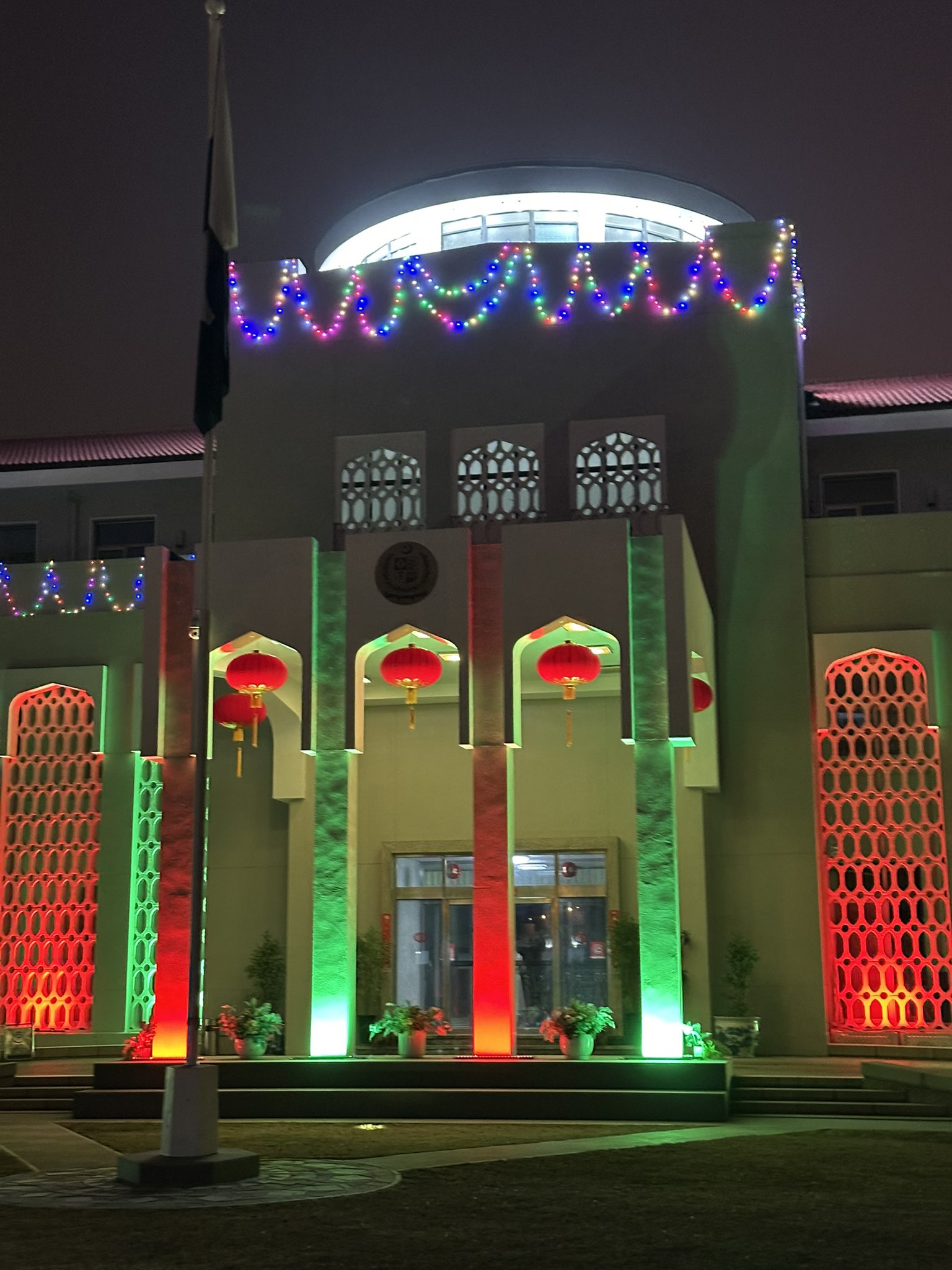
In January 2025, the Pakistani Embassy is festively decorated to welcome the Chinese New Year.
Chinese Symbols in Pakistan
The legendary Karakorum Highway is surely the most historic and important symbol of China-Pakistan friendship. However, over the course of the last seven decads, many other features have been added and launched in Pakistan symbolizing our special ties with China.
Zhou Enlai Avenue in Islamabad was the first road in Pakistan named after a foreign leader. Zhou Enlai, who is credited as an architect of China-Pakistan relations, is a widely popular and loved personality in Pakistan. He is the only Chinese leader having visited Pakistan four times.
Pak-China Friendship Centre in Islamabad is a state-of-the-art facility for holding exhibitions, conferences and meetings. It was built by China as a gift and inaugurated by Chinese Premier Wen Jiabao in 2010.
In recent years, CPEC which has been called a ‘game changer’ and a ‘transformational’ project, can truly be termed as the most significant symbol of our friendship and economic partnership. Signature projects like Neelum-Jhelum Hydro Power Plant, Gwadar Port, Multan-Sukkur Highway, Port Qasim Power Plant and Lahore Orange Metro Line have a deep impact on the lives of the common people across Pakistan. Substantially contributing to the socio-economic development of Pakistan, CPEC has also facilitated cultural exchanges and a better appreciation of Chinese support to Pakistan.
Conclusion
A strong political support and strategic cooperation is the hallmark of China-Pakistan bilateral relations. However, it would not be wrong to say that establishment of mutual trust between the two countries was largely attributed to interpersonal communications’ and regular exchanges between our political leaders, officials, businessmen, scholars, journalists and students. It would be equally true to assert that China-Pakistan relations are “a historic reality and a conscious choice of our two people”.
Over the last seven decades, this exemplary relationship which transcends the traditional precepts of interstate relations has blossomed into an iron brotherhood and time-tested strategic partnership which is pride of our two nations and envy of others. As we celebrated the 74th anniversary of establishment of diplomatic relations this year, I have strong conviction that with our joint efforts, our friendship will grow stronger and achieve even greater heights in the next 70 years. We owe this to the sweat and toil of our forefathers and it is our solemn duty to pass on the spirit of friendship to our future generations.
(The writer is a former Ambassador of Pakistan to China.)
[i] https://www.pewresearch.org/global/2014/07/14/chapter-2-chinas-image/
[ii] https://issi.org.pk/wp-content/uploads/2015/07/Pak-China_Year_of_Friendly_Exchange_Doc-1.docx.pdf
[iii] https://www.dawn.com/news/1535106
[iv] https://issi.org.pk/category/china-pakistan-study-center/
[v] https://s3h.nust.edu.pk/departments/department-of-computer-sciences/
[vi] https://cscp.edu.pk/
[vii] https://www.pakistan-china.com/
[viii]“70th Anniversary of the Establishment of Diplomatic Relations between China and Pakistan: Review and Reflection on People-to-People Exchanges” by Professor Tang Mengshan
[ix] https://www.numl.edu.pk/faculties/Confucius%20Institute
[x] https://pk.linkedin.com/in/lputcs?original_referer=https%3A%2F%2Fwww.google.com%2F
[xi] https://epwing.gov.pk/Detail/OThkYTI1M2MtY2NkOS00NDVhLWFmOGMtMzg2OGNlMmQ1MjBl
[xii] https://www.oberlo.com/statistics/tiktok-users-by-country#:~:text=Pakistan%20and%20the%20Philippines%20rank,by%20country%2C%20with%2037.7%20million.
[xiii] https://www.youlinmagazine.com/article/pakistan-and-china-co-productions-of-television-dramas/MjQ2OA==
 Editor:Qiu Xiaochen
Editor:Qiu Xiaochen